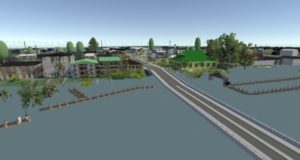Experiencing the Past and Future History of Coastal Georgia
Project Directors: Brian Orland (College of Environment and Design), Meredith Welch-Devine (Graduate School), Stephen Berry (Department of History)

This Andrew W. Mellon Foundation grant-funded project is part of the Coastal Studies research category in the Willson Center’s expanded Global Georgia Initiative.
Global climate change, if not addressed, is expected to result in slow, incremental, but unavoidable disruption of families and communities, their historical, cultural and ecological roots on the coast, their daily rituals and comforts, and their expectations for the future. Through spatially and temporally indexed narratives of change we use augmented realities to address the “grand challenge” faced by residents of the Georgia coast, a region projected to see as many as 96,000 displaced from low-lying homes by 2050. Our goal is to meaningfully embed consideration of cultural, ecological and historical change in daily thinking about the future of coastal Georgia, and to present that as a globally-relevant model for other coastal communities.
Traveling the highways of Georgia, we zip past fields, forests, and towns not seeing or knowing that we’re passing locations named in The New Georgia Guide, the New Georgia Encyclopedia, or the Historical Atlas of Georgia Counties. The augmented reality (AR) platform we are developing, Landscape ReCon, connects people to place through visual and aural info (only audio for drivers!) triggered by geo-location “cues” that tell them a story about the ecology and history of their location while also inviting them to add their own experiences and understandings of the place as geolocated sound “bites” and imagery. Our vision is to bring past and present into view while also gathering residents’ and visitors’ stories and experiences of these same places, enriching what we know about the places we live in, travel through, and visit.
The project will involve local, as well as UGA, students and citizens and leverage UGA strengths in the digital humanities, interdisciplinarity, and public engagement. Our topical focus will be the human experience of change in the iconic community of Darien in coastal Georgia. In addition to ethnographic and oral history we will use AR-mediated feedback as a means to capture and share otherwise unseen and unheard narratives of both past and future to augment experience in situ, in place, and in vivo, in the course of everyday life. Our emphasis will be on engaging the public as co-creators of shared and negotiated images of the future. These data plus extensive biophysical data provide a foundation for gathering contemporary narratives and speculations about the future connected to historical narratives of change along the Georgia coast
